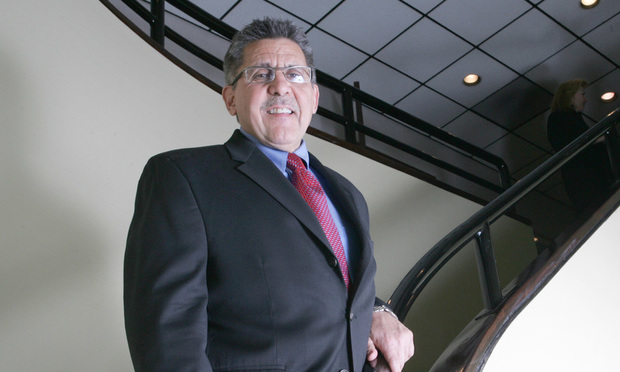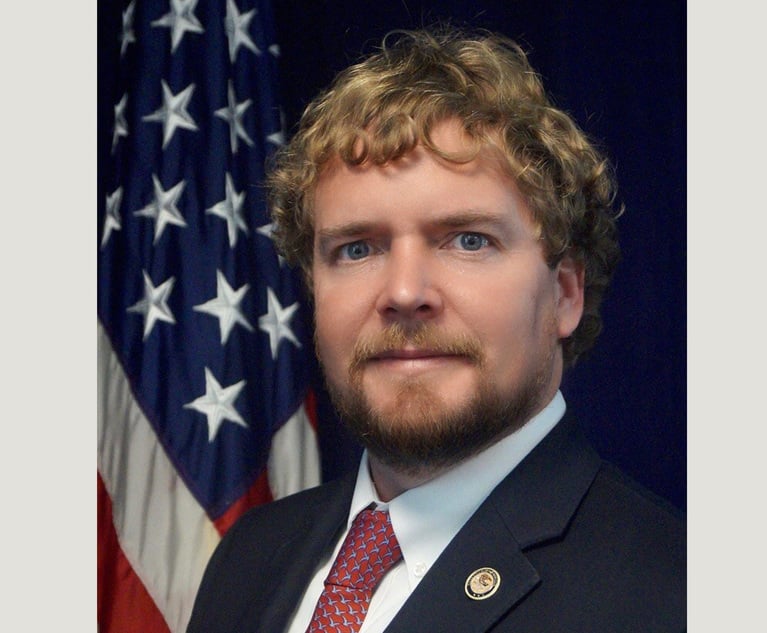Hardwick's Ex-Partner Recounts Big Debts, Expenses in Embezzlement Trial
"I did not appreciate Nat Hardwick taking money from the firm I spent 46 years building," said Art Morris, who retired from now-defunct Morris Hardwick Schneider in 2013.
September 26, 2018 at 12:34 PM
7 minute read
 Arthur J. Morris (Photo: Alison Church/ALM)
Arthur J. Morris (Photo: Alison Church/ALM)
The federal embezzlement trial of Atlanta lawyer Nathan Hardwick IV continued Tuesday with testimony for the prosecution by Hardwick's former law partner, Art Morris.
Morris told the jury that their now-defunct firm, Morris Hardwick Schneider, had paid off personal debts for Hardwick to keep bank clients happy, but he and Randy Schneider, who co-founded the residential real estate closing and default firm 40 years ago, had refused to pay for Hardwick's frequent private jet travel.
The jury paid close attention after weathering a day of testimony Monday about MHS's shareholder agreements and financial audits.
“I did not appreciate Nat Hardwick taking money from the firm I spent 46 years building,” Morris concluded, after more than three hours of questioning from Assistant U.S. Attorney Lynsey Barron and lead defense counsel Ed Garland of Garland, Samuel & Loeb.
Federal prosecutors indicted Hardwick, who'd been the majority owner of the now-defunct firm, in February 2016, alleging that he stole millions of dollars from client escrow accounts and spent almost $18 million on charter jets, casinos, bookies and women alone.
The government also indicted the firm's former controller, Asha Maurya, in 2016 as a co-conspirator, alleging that she helped Hardwick embezzle money from the firm from 2011 until August 2014, when the escrow account shortfalls were discovered.
Maurya pleaded guilty to a single count of conspiracy to commit wire fraud last year and is cooperating with the government. Hardwick's defense team has maintained that Maurya was the culprit, not Hardwick.
Reluctant Partners
Morris said he and his longtime partner, Schneider, brought Hardwick in as a partner in 2005 with an eye to their firm's future—only to see it collapse nine years later. The duo had built the residential closing firm, Morris & Schneider, that they started in 1978 into a 42-office enterprise at the time of the merger with Hardwick's smaller firm, Jackson & Hardwick, to form MHS, an 80-lawyer firm with about 60 Southeastern offices.
Morris said it was Schneider who recruited Hardwick. “I wasn't comfortable with Nat,” Morris told the jury. “I didn't like the deal. We didn't need him. I didn't like his attitude about things.”
Schneider, “an operations person,” Morris told the jury, ran the closing firm and wanted Hardwick to handle business development with the goal of expanding MHS throughout the Southeast.
Morris acquiesced to the merger, saying his own focus was a separate default firm, Morris, Schneider & Prior, and that he was preoccupied because his wife was dying of cancer. “Randy was my best friend, so I went with his judgment.”
Money Problems
Hardwick soon gained a $15 million windfall from his merger, Morris told the jury, because MHS sold off its REO division to a private equity firm soon after. As a then-minority shareholder, Hardwick shared in the gains.
Even so, Morris said, he learned by about 2008 that Hardwick was having financial problems, adding that Hardwick was spending money on casino gambling, bookies, a golf course and alimony to his ex-wife, to whom he owed $5.5 million in a divorce judgment.
“We'd get calls from banks saying 'Nat owes $200,000—and we're not going to do business with you if you don't pay it off,'” Morris said. “So Randy and I would step up and take care of it.”
Morris said MHS's clients were big lenders like Fannie Mae and Bank of America, so they couldn't “afford to have a major partner file bankruptcy.”
The firm also was paying off a $2.2 million loan Hardwick incurred to buy out his partner from Jackson & Schneider and deducting the payments from his income, Morris said.
MHS's partnership agreement specified that the partners receive quarterly distributions of net income, but Morris said Hardwick received more frequent payouts. “There was constant pressure on Nat from creditors,” which included MHS's bank clients, Morris testified, explaining that he and Schneider allowed Hardwick more frequent distributions to keep the banks' business.
Morris said he gave Hardwick $750,000 to pay for some “personal obligations” early on, because “it was important to me that Nat remain financially solvent.”
When Barron asked if Morris' role at the firm was “to keep Hardwick afloat,” Morris replied: “I was his daddy for 10 years.”
Expensive Jets
Morris agreed with Garland, on cross-examination, that his role at the firm was as “a big-picture guy,” which is how Garland had earlier described Hardwick.
Hardwick “marketed very well,” Morris acknowledged.
While both had similar business development roles—Morris for the default and Hardwick for the closing operation—they did not see eye to eye on expenses. Morris said it was fine for partners to spend $5,000 to $10,000 per month to entertain clients, who were often also friends, but he and Schneider balked at covering the millions that Hardwick spent on private jet travel.
Hardwick spent $8.5 million on private jet charters from 2007 through mid-August 2014, according to the prosecution's tally of his bills.
Of the $26 million the government alleges Hardwick embezzled with Maurya's help during the charged conspiracy time period, from 2011 until August 2014, he spent $3.7 million on charter jets to take people to casinos, golf tournaments and football games for his alma mater, the University of South Carolina, according to its pretrial filings. Another $10 million went to casino gambling and bookies, and Hardwick spent roughly $5 million on girlfriends and other women, according to the government's filings.
Morris himself “lived on airplanes,” he testified, traveling constantly to bring in business for the default operation, and he flew commercial. He and Schneider told Hardwick that “the firm was not going to pay for his private jet travel. Period.”
Charter jets cost $6,000 to $8,000 an hour, Morris added. “There is no need for that in our business. Delta is fine.”
Hardwick's Exit
Morris Hardwick Schneider had grown to about 800 employees in 13 states when the escrow account shortfalls came to light in July 2014. “To save the firm,” Morris said, he asked Hardwick to resign and give up his interest, which had expanded to 55 percent.
Fidelity National Title, MHS's largest title-insurer, had agreed to cover the escrow account shortfalls—then estimated as high as $30 million—in exchange for Hardwick's departure and a majority stake in MHS's title company, LandCastle Title.
Schneider had retired in 2010, and Morris followed in 2013, under a shareholder agreement that gave him $350,000 in annual deferred compensation and 10 percent of MHS's profits for another decade.
Hardwick asked what he'd get in return for giving up his interest in MHS, Morris testified, and he replied that their choices were limited. “I told him it was about 800 people who'd lose their jobs who live paycheck to paycheck. These were people who'd worked for me for 35 years.”
Hardwick resigned August 18, 2014. The firm filed for bankruptcy 11 months later.
READ MORE:
'A Thief and a Liar': Jurors Hear Accusations, Accounting as Hardwick Trial Begins
Law Firm's Bankruptcy Looms Over Embezzlement Trial
Judge Delays Trial in Hardwick Law Firm Embezzlement Case
Jury Selected in Hardwick Trial
Embezzlement Trial Over Defunct Atlanta Firm Will Hinge on Intent
Hardwick Says He Was Rainmaker, Not Embezzler, at MHS
Morris Hardwick Schneider Accuses Founder of Embezzling $30M
This content has been archived. It is available through our partners, LexisNexis® and Bloomberg Law.
To view this content, please continue to their sites.
Not a Lexis Subscriber?
Subscribe Now
Not a Bloomberg Law Subscriber?
Subscribe Now
NOT FOR REPRINT
© 2025 ALM Global, LLC, All Rights Reserved. Request academic re-use from www.copyright.com. All other uses, submit a request to [email protected]. For more information visit Asset & Logo Licensing.
You Might Like
View All


Trending Stories
Who Got The Work
J. Brugh Lower of Gibbons has entered an appearance for industrial equipment supplier Devco Corporation in a pending trademark infringement lawsuit. The suit, accusing the defendant of selling knock-off Graco products, was filed Dec. 18 in New Jersey District Court by Rivkin Radler on behalf of Graco Inc. and Graco Minnesota. The case, assigned to U.S. District Judge Zahid N. Quraishi, is 3:24-cv-11294, Graco Inc. et al v. Devco Corporation.
Who Got The Work
Rebecca Maller-Stein and Kent A. Yalowitz of Arnold & Porter Kaye Scholer have entered their appearances for Hanaco Venture Capital and its executives, Lior Prosor and David Frankel, in a pending securities lawsuit. The action, filed on Dec. 24 in New York Southern District Court by Zell, Aron & Co. on behalf of Goldeneye Advisors, accuses the defendants of negligently and fraudulently managing the plaintiff's $1 million investment. The case, assigned to U.S. District Judge Vernon S. Broderick, is 1:24-cv-09918, Goldeneye Advisors, LLC v. Hanaco Venture Capital, Ltd. et al.
Who Got The Work
Attorneys from A&O Shearman has stepped in as defense counsel for Toronto-Dominion Bank and other defendants in a pending securities class action. The suit, filed Dec. 11 in New York Southern District Court by Bleichmar Fonti & Auld, accuses the defendants of concealing the bank's 'pervasive' deficiencies in regards to its compliance with the Bank Secrecy Act and the quality of its anti-money laundering controls. The case, assigned to U.S. District Judge Arun Subramanian, is 1:24-cv-09445, Gonzalez v. The Toronto-Dominion Bank et al.
Who Got The Work
Crown Castle International, a Pennsylvania company providing shared communications infrastructure, has turned to Luke D. Wolf of Gordon Rees Scully Mansukhani to fend off a pending breach-of-contract lawsuit. The court action, filed Nov. 25 in Michigan Eastern District Court by Hooper Hathaway PC on behalf of The Town Residences LLC, accuses Crown Castle of failing to transfer approximately $30,000 in utility payments from T-Mobile in breach of a roof-top lease and assignment agreement. The case, assigned to U.S. District Judge Susan K. Declercq, is 2:24-cv-13131, The Town Residences LLC v. T-Mobile US, Inc. et al.
Who Got The Work
Wilfred P. Coronato and Daniel M. Schwartz of McCarter & English have stepped in as defense counsel to Electrolux Home Products Inc. in a pending product liability lawsuit. The court action, filed Nov. 26 in New York Eastern District Court by Poulos Lopiccolo PC and Nagel Rice LLP on behalf of David Stern, alleges that the defendant's refrigerators’ drawers and shelving repeatedly break and fall apart within months after purchase. The case, assigned to U.S. District Judge Joan M. Azrack, is 2:24-cv-08204, Stern v. Electrolux Home Products, Inc.
Featured Firms
Law Offices of Gary Martin Hays & Associates, P.C.
(470) 294-1674
Law Offices of Mark E. Salomone
(857) 444-6468
Smith & Hassler
(713) 739-1250







